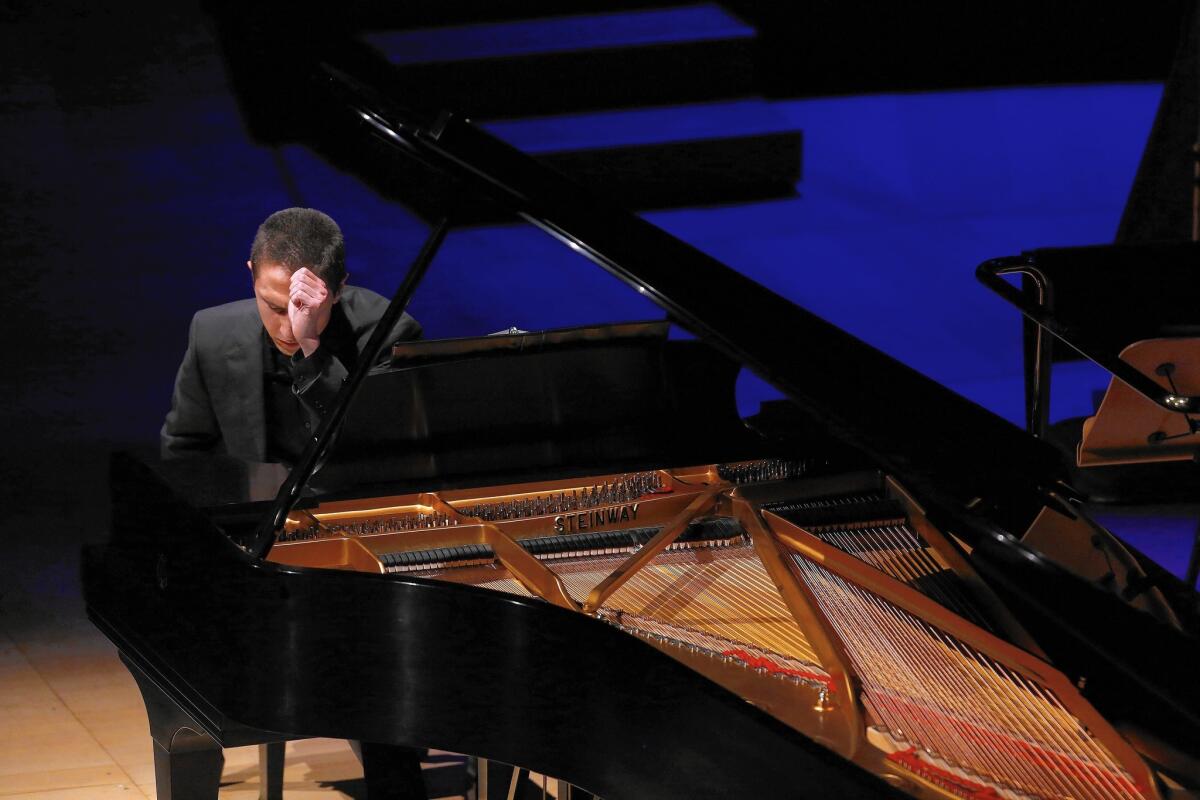Review: Los Angeles Philharmonic pays tribute to its late new-music mentor Steven Stucky

- Share via
The Los Angeles Philharmonic’s special concert in memory of composer Steven Stucky was called “Radical Light.” An uncannily heavenly light did, indeed, radiate throughout Walt Disney Concert Hall on Wednesday night. But I hope that doesn’t sound precious or somehow unreal, because the memorial could just as easily have been dubbed “Leave It to Steve.”
That is what the L.A. Phil did for more than 20 years with its composer-in-residence and new-music advisor. So the most characteristic way for the orchestra to honor Stucky, who died in February at 66 from a brain tumor, was with a reminder of the kind of Green Umbrella concerts he and Esa-Pekka Salonen put on — concerts that revolutionized the Los Angeles new-music scene and became models for revitalizing orchestra life.
Presented free and drawing a large crowd, the Stucky tribute was a quickly but skillfully organized special event not officially part of the Green Umbrella series. The latest proper Green Umbrella concert, a clumsy “21C Liederabend” the night before, had been entrusted to a New York producer. So it almost seemed as if Salonen had dashed west between performances of the Strauss “Elektra” he is conducting to rave reviews at the Metropolitan Opera (the Live in HD broadcast will be in movie theaters April 30) to show how he and Stucky did it.
In a video that began the evening, Salonen likened his first meeting with Stucky a quarter century ago to encountering a long-lost older brother, someone capable of not just musical camaraderie but also of guiding the young conductor through, say, the complexities of single malt Scotch whiskey. With Stucky, music and camaraderie were necessarily linked.
“Radiant Light” left it to Steve, providing ample example of Stucky as marvelous composer as well as encompassing Stucky’s role of new-music community organizer and mentor. Along with the L.A. Phil’s New Music Group (pretty much every member of the orchestra seems to have counted Stucky as a personal friend), there was also a reflection of his broader involvement with the L.A. musical community.
The Lyris Quartet, a resident ensemble of the Jacaranda new-music series in Santa Monica, gave an exquisite performance of Stucky’s “Nell’ombra, nella Luce,” a sensual play of shadow and light. It was inspired by the Italian landscape Stucky loved and had the quality of discovering an ugly truffle hidden in the dirt that, when you bite into it, releases a wondrous essence of life.
Pianist Gloria Cheng, who won a Grammy for a CD she made of solo pieces by Stucky and Polish composer Witold Lutoslawski (sometimes the Grammys get it right), played Stucky’s “Four Album Leaves,” each an enchanting and also playful (an adjective that needs much use when discussing Stucky) character study. She also joined her Piano Spheres colleagues in the premieres of six solo piano miniatures written for the occasion by composers close to Stucky.
Two were by young composers who studied with Stucky at Cornell University. A devoted educator, he set up a mentoring program at the Philharmonic for high school composers, and the orchestra’s president, Deborah Borda, used the concert as an occasion to announce the creation of a composer fellowship fund in Stucky’s name.
Perhaps the most touching tribute to Stucky is the way both young composers followed in Stucky’s resonant, radiant and playful footsteps without sounding anything like him. Mandy Fang’s “That raindrops have hastened the falling flowers” had Mark Robson playing a toy piano with his right hand and a grand with his left, the toy’s tinkle acting like rain on the grand’s flowery chords. The ringing character of Joseph Phibbs’ Elegy, featuring Vicki Ray, was flowery in a different but just as resonant way.
The miniatures (most around a minute or two) by well-known composers were each distinctive and personal. They included an eerie work by James Matheson played by Nic Gerpe, Anders Hillborg’s tremulous “Just a Minute” played by Susan Svrcek, and Magnus Lindberg’s romantic “Fratello” played by Steven Vanhauwaert. The largest, Salonen’s “Iscrizione,” written for Cheng, sounds like a study for a larger work in its fantastical development of a small melodic cell.
Salonen’s other contribution was conducting three important ensemble pieces, two by Stucky and one by Lutoslawski, with whom both the younger composers were close. Salonen’s performance of “Boston Fancies,” the piece with which the orchestra began its relationship with Stucky in 1987, revealed a thirtysomething composer already able to sneak in radiance amid his trademark formal and playful sophistication.
Stucky struggled to finish a short choral piece, “The Music of Light,” in his final weeks. A luminous performance by the Los Angeles Master Chorale revealed that Stucky reveled in light to the end. I initially mistyped the title as “The Music of Life,” and I hesitate to correct it.
The evening ended with yet another superb performance, this of one of Lutoslawski last pieces, “Chantefleurs et Chantefables” (“Songflowers and Songfables”).
Salonen recorded this a surreal song cycle for soprano and orchestra with Dawn Upshaw and the L.A. Phil in 1994, a CD the conductor and Stucky devised in tribute to the Polish composer who died that year.
The songs are deceptive miniatures, nursery rhymes with a dangerous edge. Hila Plitmann was the soloist Wednesday, singing from memory and giving life and personality to each. Salonen made every odd instrumental detail speak. Rather than song as pompous spectacle, it became here personal and communal.
Leave it to Steve: That is who he was and what he stood for and why we need him more than ever.
More to Read
Only good movies
Get the Indie Focus newsletter, Mark Olsen's weekly guide to the world of cinema.
You may occasionally receive promotional content from the Los Angeles Times.










